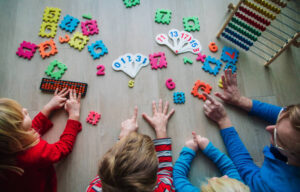In today’s classrooms, the most memorable lessons often come from the most interactive moments. Educational games for kids offer a fantastic way to make learning enjoyable and hands-on. These games not only strengthen academic concepts but also build essential life skills like communication, teamwork, and problem-solving.
Many of the best international schools in Whitefield encourage activity-based learning, using fun educational games to make lessons more engaging and impactful. Whether you’re a teacher planning classroom activities or a parent looking for creative learning methods, these fun games will turn your school day into an exciting adventure.
1. Word Chain
A fast-paced vocabulary-building game that sparks quick thinking and language skills.
How to Play: Choose a student to start with any word (e.g., “apple”). The next student must say a word starting with the last letter of the previous word (e.g., “elephant”). Continue the chain around the class. You can add themes like animals or food to increase the challenge. If a student repeats a word or takes too long, they’re out for that round.
Skills Developed:
- Vocabulary
- Listening and recall
- Critical thinking
Ideal For: Grades 2–5
2. Math Puzzle Relay
Turn problem-solving into a team sport with this high-energy math game.
How to Play: Divide students into small groups. Give each group a set of math puzzles — these could be word problems, equations, or brain teasers based on your lesson. For example, include challenges related to real numbers like solving equations, identifying rational and irrational numbers, or applying properties of real numbers.
The first team to solve all their puzzles correctly and raise their hand wins. To make it more exciting, turn it into a relay — one student solves a problem and then tags the next. This activity not only reinforces concepts of real numbers but also builds teamwork and problem-solving skills in a fun way.
Skills Developed:
- Logical reasoning
- Team collaboration
- Math fluency
Ideal For: Grades 3–6
3. Who Am I? (Subject Edition)
A guessing game that boosts subject knowledge while encouraging students to ask smart questions.
How to Play: Tape a card with a word or name (from your current lesson) to each student’s back. Students walk around and ask yes/no questions to figure out their identity. For example, “Am I a scientist?” or “Do I live in the water?” Great for science, history, or literature themes.
Skills Developed:
- Inquiry and questioning
- Memory and recall
- Peer interaction
Ideal For:Grades 3–7
4. Sentence Builder Challenge
A grammar-focused activity that turns sentence construction into a creative game.
How to Play: Give each group a stack of word cards (nouns, verbs, adjectives, etc.). Students must use the words to build grammatically correct sentences within a set time. This fun activity helps students understand the parts of speech and how they work together to form meaningful sentences.
Encourage creativity, correct punctuation, and offer extra points for using complex vocabulary or interesting sentence structures. It’s a great way to reinforce grammar skills while making learning fun and interactive!
Skills Developed:
- Grammar and syntax
- Creative writing
- Language structure
Ideal For: Grades 2–5
5. Story Circle
Imaginative storytelling meets collaborative creativity in this fun group activity.
How to Play: Sit students in a circle. One student starts a story with a sentence (e.g., “Once upon a time, a cat flew a spaceship…”). Each student adds a new sentence to continue the story. The game continues until everyone has added their part. You can also theme it by subject—like a historical event or a science fiction concept.
Skills Developed:
- Imagination and narrative skills
- Listening and collaboration
- Verbal expression
Ideal For: Grades 1–5
6. Trivia Toss
A quiz-style game that gets kids moving while testing their knowledge.
How to Play: Prepare trivia questions related to your current subject. Toss a soft ball to a student and ask them a question. If they answer correctly, they toss it to someone else. If not, the ball goes back to you. Continue until everyone gets a turn or all questions are answered.
Skills Developed:
- Subject comprehension
- Listening
- Reflexes and coordination
Ideal For: Grades 3–6
7. Classroom Scavenger Hunt
A fun and active way to review concepts or vocabulary around the classroom.
How to Play: Hide clues or flashcards around the room that relate to a specific subject (e.g., math problems, science terms, historical facts). Students hunt for and solve each clue. The first team to complete the hunt wins. Bonus: create themed scavenger hunts for special occasions!
Skills Developed:
- Observation
- Teamwork
- Concept reinforcement
Ideal For: Grades 2–5
8. Pictionary (Academic Edition)
Turn drawing into a tool for learning new terms and concepts.
How to Play: Divide the class into two teams. One student from each team draws a vocabulary word or concept on the board while their team guesses. Set a timer for added excitement. Use this game for science, history, or language classes.
Skills Developed:
- Visual learning
- Concept association
- Communication
Ideal For: Grades 2–6
9. Spelling Bee Showdown
An engaging twist on the traditional spelling bee.
How to Play: Call students one by one to spell out words aloud. Add difficulty levels by including definitions or asking them to use words in a sentence. Create teams and score points for each correct word. A great way to review word lists!
Skills Developed:
- Spelling
- Pronunciation
- Vocabulary development
Ideal For: Grades 1–5
10. Educational Apps for Kids (Online Games)
Mix in a few digital favorites to blend tech with learning.
Suggested Apps:
- Kahoot! – Create quiz games students can answer on their devices.
- Prodigy Math – Fantasy adventure meets curriculum-aligned math practice.
- Duolingo ABC – Fun phonics and reading practice for young learners.
Skills Developed:
- Interactive learning
- Subject revision
- Independent practice
Ideal For: Grades 1–6 (with devices available)
Conclusion
Classroom learning doesn’t have to mean sitting still. These educational games for kids bring energy, laughter, and real learning into the room. They reinforce academic concepts, encourage collaboration, and most importantly, make school a place students truly enjoy.
Many of the best schools in Bangalore focus on activity-based learning, using fun and interactive methods to keep students engaged and motivated. Teachers can use these activities to complement lessons, while parents can adapt many of them at home. When kids learn through play, the lessons stick — and the memories last even longer.
FAQs
Educational games are activities designed to teach specific academic or life skills in a fun, engaging way. They combine learning with play.
Yes, most of these games require minimal materials and can be adapted for any classroom setup.
Many of them are directly tied to subjects like math, language, science, and general knowledge, supporting what’s taught in class.
“Word Chain” and “Sentence Builder Challenge” are excellent for vocabulary development.
Absolutely! Most games can be simplified for home settings and are great for family learning sessions.







